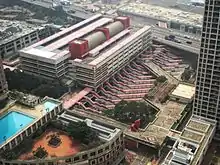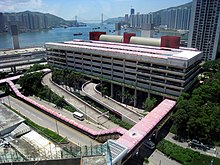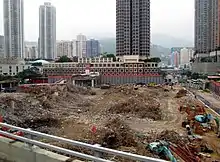| Tsuen Wan Transport Complex | |||||||||||
|---|---|---|---|---|---|---|---|---|---|---|---|
| Traditional Chinese | 荃灣運輸大樓 | ||||||||||
| Simplified Chinese | 荃湾运输大楼 | ||||||||||
| |||||||||||
.jpg.webp)



Tsuen Wan Transport Complex (Chinese: 荃灣運輸大樓) was a large transport hub in Tsuen Wan, Hong Kong. There was a bus terminus and taxi stand on the ground floor; on top sat a multi-storey car park.
Location
Tsuen Wan Transport Complex was located at No. 98 Tai Ho Road, in South Tsuen Wan, near the shore. When it was completed in 1986, it was located next to the Tsuen Wan Town Hall (completed in 1980) and the Tsuen Wan Ferry Pier (demolished in 2000 and rebuilt further south following land reclamation) in an otherwise mostly undeveloped zone of Tsuen Wan New Town. The surrounding area has since then undergone development, and the building later sat next to Clague Garden Estate (1989), Tsuen Wan West station (2003) and Nina Tower (2007).
History
Construction of the Complex started in 1983.[1] The multi-storey car park opened in April 1986.[2] Starting from 1 May 1997, the multi-storey car park was managed by Wilson Parking, taking over from Metropark, a Wharf subsidiary.[3][4] A driving school operated on the 9th and 10th floors of the building since 1999.[5][6] As of 2009, the Complex was planned for demolition or partial demolition under the MTR Corporation's TW5 property development project.[7] A case in 2010 about environment nuisances caused by street sleepers dwelling in the Complex, highlighted the fact that it had been unclear since 1986, which Government Department held management responsibility for the Complex.[8] As of February 2012, most of the bus routes using the Complex had relocated their termini elsewhere, and most of the building had fallen into disuse.
Features
With 778 parking spaces for private cars, the multi-storey car park was, as at December 2011, the second largest Transport Department multi-storey car park after Rumsey Street Car Park.[9]
Demolition
The building was of little use in recent years, especially following the relocation of bus stops in the complex to the new bus terminus not long after the completion of Tsuen Wan West station. As the building occupied the site of further planned residential development (known as the TW5 project, and part of the Tsuen Wan West station property development plan), it was due to be closed on 5 February 2013. The remaining minibus services moved out of the building to the nearby Nina Tower bus / minibus station on 27 January 2013.
The multi-storey car park was closed with effect from 1 February 2013,[10] and the transport complex was subsequently demolished. The site will become host to a new private housing estate called "Cityside", developed by Chinachem Group.[11]
See also
References
- ↑ Great Britain. Colonial Office, Hong Kong. Government Information Services (1983). Hong Kong. Govt. Press. p. 108.
- ↑ Transport Department: Parking Statistics, October 2011
- ↑ Brendan Delfino (14 April 1997). "Car park company may put up prices". South China Morning Post. Hong Kong. p. 6.
- ↑ Transport Department: Car Park Operators Archived 17 September 2011 at the Wayback Machine
- ↑ Transport Department: New driving school to be provided in Tsuen Wan, 16 October 1999
- ↑ Antoine So (10 August 1999). "Driving school row erupts". South China Morning Post. Hong Kong. p. 4.
- ↑ Agreement No. CE 1/2009 (HY). Draft Brief (13.3.2009)
- ↑ Government Secretariat, The Government Minute in Response to the 22nd Annual Report of the Ombudsman 2010. Case No. 2008/3649 : Mishandling a complaint about street sleepers at a Government complex, 8 December 2010. pp. 42-44
- ↑ Transport Department: Carparks
- ↑ "Transport in Hong Kong > Parking > Carparks". Transport Department. 17 July 2014. Retrieved 30 July 2014.
- ↑ "TW5 Cityside". Archived from the original on 10 February 2015. Retrieved 10 February 2015.
Further reading
- Walker, Anthony; Rowlinson, Stephen M. (1990). The building of Hong Kong: constructing Hong Kong through the ages. Published for The Hong Kong Construction Association by Hong Kong University Press. p. 187. ISBN 978-962-209-276-1.